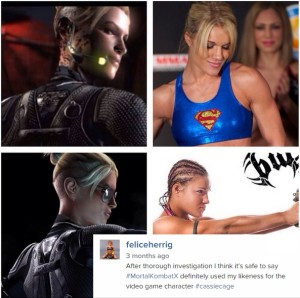April 13, 2015
 Earlier this month, mixed martial arts (MMA) fighter Felice Herrig took to Instagram to accuse video game developer NetherRealm Studios and its parent/distributor Warner Bros. Interactive Entertainment, Inc. of using her likeness without permission. Herrig claims that her image served as a model for “Cassie Cage,” a character in the newly released game Mortal Kombat X.
Earlier this month, mixed martial arts (MMA) fighter Felice Herrig took to Instagram to accuse video game developer NetherRealm Studios and its parent/distributor Warner Bros. Interactive Entertainment, Inc. of using her likeness without permission. Herrig claims that her image served as a model for “Cassie Cage,” a character in the newly released game Mortal Kombat X.
The UFC fighter’s allegations beg the question: Can digital copies of another person’s likeness amount to unlawful right of publicity violations?
Felice Herrig and Mortal Kombat X’s Cassie Cage
Mortal Kombat X, which was released for PlayStation 4, Xbox One and PC just last week, features the new character Cassie Cage – a Special Forces fighter and daughter of the original 1992 game’s Sonya Blade and Johnny Cage characters. Over the past three months, Herrig has posted images and video clips of Cassie Cage to her Instagram account, often comparing screenshots from the game to photographs of herself and alleging that the character is a digital mock-up of her likeness.
In a recent interview, Herrig stated: “There’s the images that are the exact same photos I’ve done in photoshoots and they’re the exact same poses used for Cassie Cage’s character . . . . I definitely believe they used my likeness. I think that Cassie Cage is 100-percent me.” Reports indicate that the fighter is exploring potential legal action against the game developers, which are currently reaping the rewards of its biggest launch in the franchise’s history.
Name and Likeness and the Right of Publicity
As readers of this blog are aware, intellectual property rights exist with respect to a person’s name and likeness. The laws of at least 47 states have acknowledged a “right of publicity,” which grants an individual the right to prohibit third parties from commercializing his or her name, image, voice and/or likeness without permission.
In Herrig’s home state of Illinois, for example, the victim of a right of publicity violation can sue for actual damages, profits derived from unauthorized use and/or attorneys’ fees. If the violation is willful, the individual may also be entitled to punitive damages.
Developers: Cutting Corners Could Be a Fatality
Developers should not exploit an individual’s name or likeness for commercial purposes without first obtaining his or her written consent (or, in some jurisdictions, the consent of his or her heirs or other successors-in-interest if the person is deceased). As Herrig’s allegations demonstrate, even those designing fictional characters must remain vigilant about obtaining the written permission of any person who may have served as a model or inspiration for a project.
If you create or distribute content that features photographs, videos, audio recordings or other renderings of another individual, or if you have been served with legal process relating to the alleged use of another person’s name or likeness, please e-mail us at info@kleinmoynihan.com or call us at (212) 246-0900.
The material contained herein is provided for information purposes only and is not legal advice, nor is it a substitute for obtaining legal advice from an attorney. Each situation is unique, and you should not act or rely on any information contained herein without seeking the advice of an experienced attorney.
Attorney Advertising
Related Blog Posts:
The Impact of the O’Bannon Ruling on the Collegiate Athletics Commercial Market and Fantasy Sports
Klein Moynihan Turco Scores Major Trademark Infringement Win
Legal and Business Concerns of the Newly Minted Social Media Star



